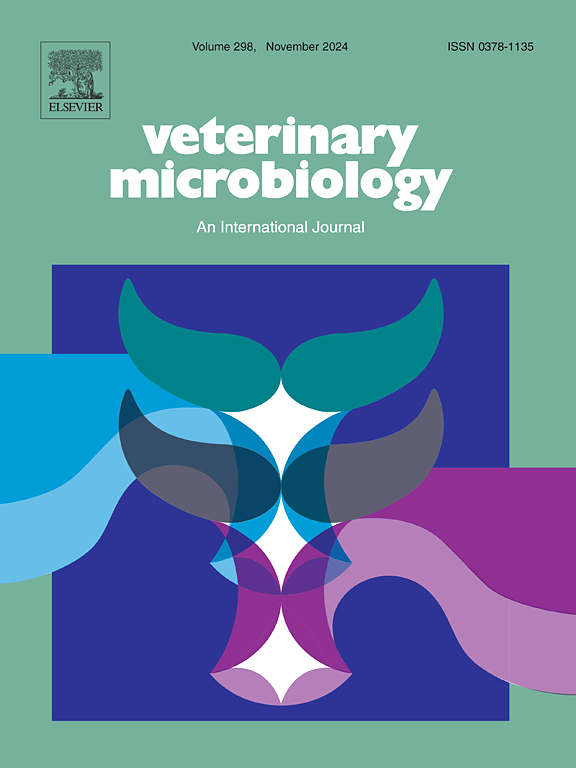Effects of Ikaros (IKZF1) gene in the virulence of Marek’s disease virus
IF 2.7
2区 农林科学
Q3 MICROBIOLOGY
引用次数: 0
Abstract
Marek’s disease (MD) caused by the oncogenic avian herpesvirus, Marek’s disease virus (MDV) has significant economic impacts on the poultry industry because MDV is ubiquitous in the environment and most chickens are exposed to the threat by MDV from the first day of age. Meq, a bZIP transactivator, is required for tumor formation by MDV, mostly T cell lymphomas. Additionally, Ikaros (IKZF1) has been identified as a cancer driver gene for MDV tumorigenesis. The safety of G2M-WT-Ikaros, which contains wildtype IKZF1 gene in the virulent MDV genome as a potential vaccine candidate, was compared with the parental G2M and Rispens vaccine. Although G2M-WT-Ikaros has significantly reduced virulence (tumor formations), immunosuppression by the atrophies of thymus and bursa remained. The immune suppressions of G2M-Ikaros viruses with Meq, G2M-WT-Ikaros, G2M-MUT-Ikaros, or without Meq, G2M∆MeqWT-Ikaros, G2M∆MeqMUT-Ikaros were compared with G2M viruses. Interestingly, G2M-MUT-Ikaros showed the highest virulence in tumor formation, mortality, and MD incidences, even higher than that of parental G2M viruses, while G2M-WT-Ikaros showed reduced tumorigenicity and MD incidences. With Meq deletion, G2M∆MeqWT-Ikaros, and G2M∆MeqMUT-Ikaros virus significantly reduced tumor formations; however, the immunosuppression by those viruses still occurred, regardless of the different IKZF1 gene sequences, either wildtype or somatic mutated, in the MDV genome. Thus, MDV tumorigenicity by Meq gene is enhanced by IKZF1 mutations, but ectopic wildtype IKZF1 expression showed suppression of MDV-induced tumors.
Ikaros (IKZF1)基因在马立克病病毒毒力中的作用
马立克病(Marek 's disease, MD)是一种由致癌性禽疱疹病毒(Marek 's disease virus, MDV)引起的疾病,由于MDV在环境中无处不在,而且大多数鸡从出生第一天起就受到MDV的威胁,因此对家禽业造成了重大的经济影响。Meq是一种bZIP反激活因子,是MDV(主要是T细胞淋巴瘤)形成肿瘤所必需的。此外,Ikaros (IKZF1)已被确定为MDV肿瘤发生的癌症驱动基因。G2M- wt - ikaros作为潜在候选疫苗与亲本G2M和Rispens疫苗的安全性进行了比较。G2M- wt - ikaros在毒力强的MDV基因组中含有野生型IKZF1基因。尽管G2M-WT-Ikaros显著降低了毒力(肿瘤形成),但胸腺和囊萎缩引起的免疫抑制仍然存在。比较添加Meq、G2M- wt - ikaros、G2M- mut - ikaros和不添加Meq、G2M∆MeqWT-Ikaros、G2M∆MeqMUT-Ikaros对G2M- ikaros病毒的免疫抑制效果。有趣的是,G2M- mut - ikaros病毒在肿瘤形成、死亡率和MD发病率方面表现出最高的毒力,甚至高于亲本G2M病毒,而G2M- wt - ikaros病毒的致瘤性和MD发病率降低。缺失Meq后,G2M∆MeqWT-Ikaros病毒和G2M∆MeqMUT-Ikaros病毒显著减少肿瘤形成;然而,不管在MDV基因组中IKZF1基因序列是野生型还是体细胞突变,这些病毒的免疫抑制仍然发生。因此,IKZF1突变增强了Meq基因的MDV致瘤性,但异位野生型IKZF1表达对MDV诱导的肿瘤有抑制作用。
本文章由计算机程序翻译,如有差异,请以英文原文为准。
求助全文
约1分钟内获得全文
求助全文
来源期刊

Veterinary microbiology
农林科学-兽医学
CiteScore
5.90
自引率
6.10%
发文量
221
审稿时长
52 days
期刊介绍:
Veterinary Microbiology is concerned with microbial (bacterial, fungal, viral) diseases of domesticated vertebrate animals (livestock, companion animals, fur-bearing animals, game, poultry, fish) that supply food, other useful products or companionship. In addition, Microbial diseases of wild animals living in captivity, or as members of the feral fauna will also be considered if the infections are of interest because of their interrelation with humans (zoonoses) and/or domestic animals. Studies of antimicrobial resistance are also included, provided that the results represent a substantial advance in knowledge. Authors are strongly encouraged to read - prior to submission - the Editorials (''Scope or cope'' and ''Scope or cope II'') published previously in the journal. The Editors reserve the right to suggest submission to another journal for those papers which they feel would be more appropriate for consideration by that journal.
Original research papers of high quality and novelty on aspects of control, host response, molecular biology, pathogenesis, prevention, and treatment of microbial diseases of animals are published. Papers dealing primarily with immunology, epidemiology, molecular biology and antiviral or microbial agents will only be considered if they demonstrate a clear impact on a disease. Papers focusing solely on diagnostic techniques (such as another PCR protocol or ELISA) will not be published - focus should be on a microorganism and not on a particular technique. Papers only reporting microbial sequences, transcriptomics data, or proteomics data will not be considered unless the results represent a substantial advance in knowledge.
Drug trial papers will be considered if they have general application or significance. Papers on the identification of microorganisms will also be considered, but detailed taxonomic studies do not fall within the scope of the journal. Case reports will not be published, unless they have general application or contain novel aspects. Papers of geographically limited interest, which repeat what had been established elsewhere will not be considered. The readership of the journal is global.
 求助内容:
求助内容: 应助结果提醒方式:
应助结果提醒方式:


